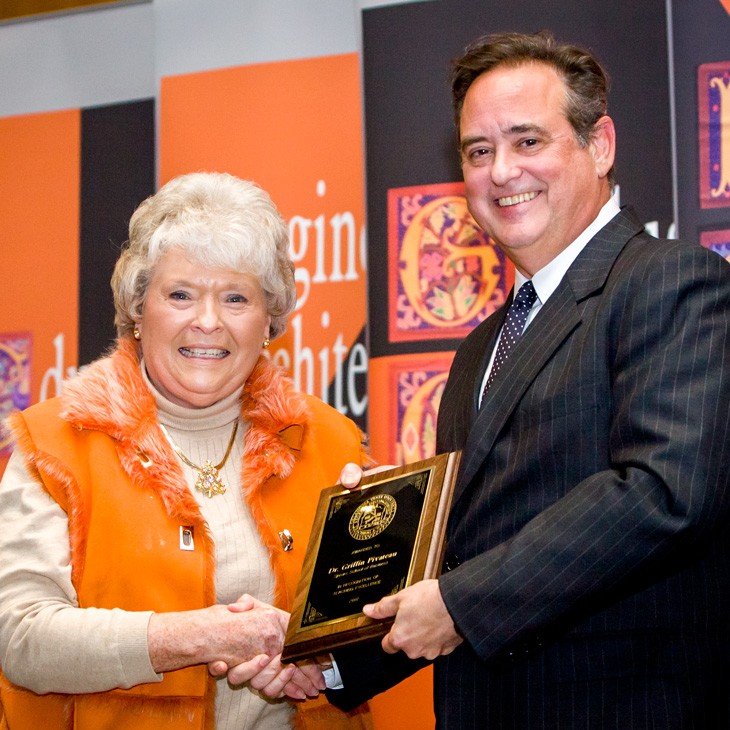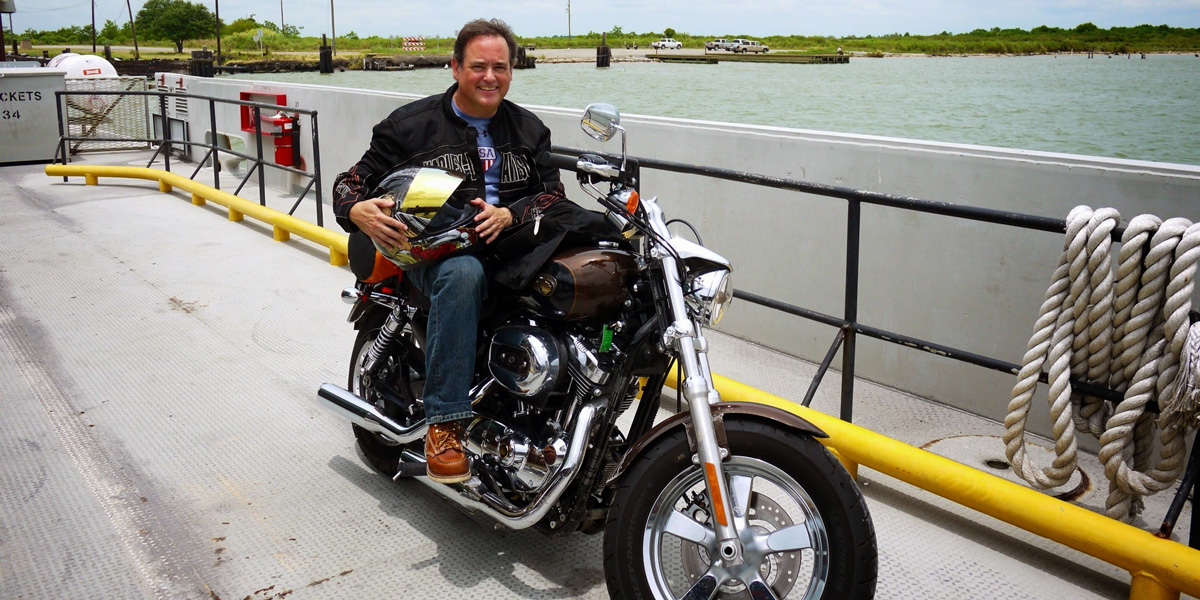Discussion Points: Griffin Pivateau
By John Helsley
Age: 57 | Hometown: Lake Charles, Louisiana
Griffin Pivateau always thought he’d be a newspaper man. Or a rock star. Or a king. While he hasn't given up on all his boyhood dreams, Oklahoma State University’s assistant professor of legal studies in the Spears School of Business is doing just fine, recently recognized as a recipient of the Regents Distinguished Teaching Award. Pivateau, now in his eighth year at Spears Business, sat down to reflect on his life, past and present.
I’m from Louisiana, which as my brother says is a good place to be from. I love Louisiana. I love the heritage, the culture, the people, the history of it. Matter of fact, when I got out of law school at the U of Texas, I actually moved back to Louisiana to practice.

I grew up the third of four brothers. We were all within five or six years of one another. It was a tightknit family. People often wonder, ‘Did you fight with your siblings a lot?’ In fact, we didn’t. We got along incredibly well. We didn’t have much money, but I don’t think we realized we didn’t have much money. In retrospect, you look back and go, ‘Wow, I was poor.’ But it didn’t feel like it at the time. And I owe that to my mom, who always went the extra yard to take care of us.
It sounds cliché, but one of my inspirations has always been my mother. She worked and kept us all fed and clothed, back at a time when a lot of moms didn’t work outside the home. She was always strong and independent. And I’ve always looked up to her. Even today, when I think about heroes, I think about her.
I graduated from McNeese (State University) and then went to law school at the University of Texas. And I got there and there were other people there who were starting law school who were from Dartmouth and Princeton, but yet we were all on the same equal footing. It really dawned on me that it doesn’t matter, as long as you do well.
I loved Austin. It was an eye-opening experience, because you are suddenly thrust into a situation where there are a lot of smart people. Growing up in Lake Charles, I was one of the smartest people I knew. Then you go to a place like the University of Texas Law School, and everyone there is smart. You suddenly become a small fish in a big pool.
There was a pretty major detour into law school. My plan was to be a history professor. In fact, that’s what I graduated with from undergrad and what I started my PhD at SMU in Dallas. While I was there, I sat down with one of the younger PhDs and talked about the market realities of a history PhD and he said, ‘If there’s anything else you can do, you should do it.’
As most people who go to law school do, I became a lawyer. I practiced law for a number of years in Austin and back in Louisiana and finally in Houston. But I always had this idea in my head that I would go back and be a college professor. I was still living that sort of vicarious lifestyle of, ‘Where would I be had I finished that history degree?’
So it dawned on me finally that I could still be a college professor, I would just need to teach the law. So I decided I was going to do it.
Fortunately, we live in a golden age of looking stuff up, because I didn’t know where to start. So I looked it up online, how do you become a college professor?
The first thing you have to do is write. So I started writing and got an article published. And I was happy with that. Step 2 was, you’ve got to go get some experience teaching. I had trouble finding a place to work as an adjunct (professor). I finally got a job at the local community college teaching history, not the law, based on my previous background.
The twist was it was a 6 a.m. Monday-Wednesday- Friday class. I took it because no one else wanted that class. But I’ve got to tell you, it was a great experience. It turns out that if a student signs up for a 6 a.m. Monday-Wednesday-Friday class, they’re going to be pretty motivated. So I had a classroom of 20 or 30 people, and every one of them wanted to be there.

I ride motorcycles. That’s a big part of my life. I do feel passionate about motorcycles. I try to get out every weekend and ride around. Fortunately, here in the state, we’ve got a lot of places to ride. There’s not a lot of traffic. I ride my motorcycle to and from work, because I think that’s the best way to start and finish your day.
The best part about it is when you ride a motorcycle, you can only think about riding a motorcycle. So you get away from all these thoughts that are in your head, so it’s relaxing in what you are doing. It’s relaxing in a way, because you’re out there where you can only focus on riding the bike at that point, and not the rest of the world.
I’ve got a garage full (of bikes), unfortunately. I’ve got a sport bike, I’ve got a touring bike, I’ve got a Harley. And I’ve got a little scooter. I have a number of options to choose from. I’ve never been tied to one kind of riding, because I think as long as you’re on two wheels, it’s all fun.
I’ve been very fortunate, because I’ve had now three different Supreme Courts cite my articles. This most recent one, in Nevada, they essentially adopted my article – the proposal I made in my article is the law in Nevada. It was quite a rewarding feeling. They cited me at least eight different times in the opinion. And it was really vindication. This was an argument I made years ago and to see it go out into the world and see it actually be put into practice, that’s the best feeling you can have as an academic, that you are having an affect on the real world; real people with real problems are relying on the solutions you developed.
The favorite part of the job is teaching. And not just the aspect of teaching, but the interaction with the students, the opportunity to engage with people who are interested in learning about the world.
I just finished 7 1/2 years at Spears. And it’s been a wonderful time. I’ve really enjoyed my time here. I was very fortunate in ending up here, as opposed to some of the other places I interviewed.
I love the students at Spears. We have a student body that overwhelmingly is composed of people who are interested in learning. Maybe they grew up in a small town and this is their chance to learn more about the world. Or maybe they’re coming from a place like Dallas, where they’ve always been in big giant classes and they’ve come to a classroom of 25 people and actually enjoy the opportunity to actually speak with the professor.
When I was growing up, I wanted to be everything simultaneously. I wanted to be a Marine. I wanted to be a king. I wanted to be a policeman. But I really, really, really wanted to be a rock star. I got a guitar for my 16th birthday. From then on, I knew this was going to be a part of my life.
I love to sing. I love to play the guitar. I have put out a couple of albums, but kind of let it go. Just for my own amusement.
There’s a place down in Houston that has an open-mic night every Monday. I’ve gone down there a number of times and just played, to get that feeling of being live. And you can play whatever you want. Do a cover song, do an original. There’s a dozen people there, most of whom are looking to go up on stage next. There’s not a lot of stress involved.

